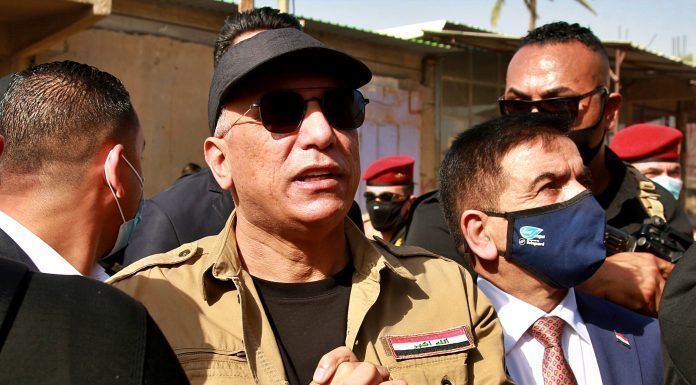BAGHDAD, Nov 7 (Reuters) – A drone laden with explosives targeted the residence of Iraqi Prime Minister Mustafa al-Kadhimi in Baghdad early on Sunday in what the Iraqi military called an attempted assassination, but said Kadhimi escaped unhurt.
The attack, which security sources said injured several members of Kadhimi’s personal protection, came after protests in the Iraqi capital over the result of a general election last month turned violent.
The groups leading protests and complaints about the result of the October vote are heavily-armed Iran-backed militias which lost much of their parliamentary power in the election. They have alleged voting and vote-counting irregularities.
No group immediately claimed responsibility for the attack on Kadhimi’s residence in Baghdad’s fortified Green Zone, which houses government buildings and foreign embassies.
A statement from the Iraqi military said that the attack targeted Kadhimi’s residence and that he was in “good health”. It provided no further detail.
Kadhimi’s official Twitter account said the prime minister was safe and called for calm.
Two government officials said Kadhimi’s residence had been hit by at least one explosion and confirmed to Reuters that the prime minister was safe.
Security sources told Reuters that six members of Kadhimi’s personal protection force stationed outside his residence had been injured.
Western diplomats based nearby in the Green Zone said they heard explosions and gunfire in the area.
Supporters of Iran-aligned militia groups which have grown their power in parliament and government in recent years have alleged voter fraud and irregularities in counting the results of the Oct. 10 election.
Protests by supporters of parties who dispute the results of the vote turned violent on Friday when demonstrators pelted police with stones near the Green Zone, injuring several officers.
The police responded with tear gas and live gunfire, killing at least one demonstrator, according to security and hospital sources in Baghdad.
Independent analysts say the election results were a reflection of anger towards the Iran-backed armed groups, which are widely accused of involvement in the killing of nearly 600 protesters who took the street in separate, anti-government demonstrations in 2019.
(Reporting by John Davison, Baghdad newsroom; Editing by David Gregorio and Alistair Bell)


